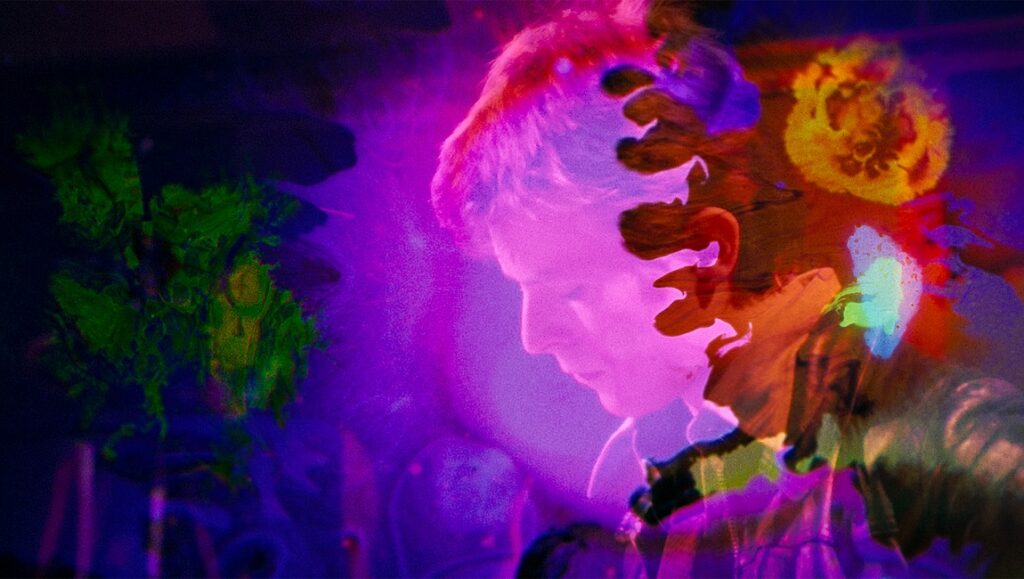Moonage Daydream is a joyous, eccentric, and experimental documentary that should please Bowie fanatics, glam rock die-hards, and adventurous cinephiles in equal measure.
If one were asked to think of rock music influences, there would no doubt be a laundry list of artists and groups who would immediately come to mind in terms of their sonic contributions and evolutions of the genre. But if are to go beyond mere musicality and name those who, on a more aesthetic level — visuals, personality, etc. — most profoundly contributed to the reimagination of pop-rock imagery and style, the Brixton wunderkind David Bowie would indisputably be at the fore of the vanguard. Active from the early ’60s until his passing in 2016, Bowie was a consistently peculiar, singular maverick who never ceased, above all, to rediscover and reinvent himself. In moving through various phases of a career that found him donning several colorful personas (from Ziggy Stardust to The Thin White Duke to Blind Prophet, and many others), for Bowie the essence of art was epitomized in an eternal quest to — as he indicates — find his relationship with the universe, a search which is revealed in the expansion, expression, and exploration, of one’s very existence. This crucial perception, then, is exactly what made Bowie stretch the boundaries of his vision beyond music and into multiple other artistic fields, from experimental videography and filmography to painting, sculpting, and, indeed, shapeshifting (re)presentations which were made explicit in his compelling hairstyles, make-up, and fashion. It’s quite obvious that these individualistic expressions were what lead audiences to worship Bowie’s fantastically chameleonic character, the artist conceiving of himself as a living corporeal canvas: an otherworldly eidolon, a messiah rock star, an androgynous Greek god, an extraterrestrial ambassador of love, hope, and a dash of wizardry. He was an enigma whose sexuality bewildered earlier generations, a man who, in his own words, collected personalities, ideas, and a hodgepodge of philosophies in order to form his bedrock of spirituality: a Buddhist on Tuesday turned Nietzschean by Friday, a bold, curious performer who was willing to garb himself in the trappings of everything from Shakespearean theater to Kabuki, from mime techniques to modern French-New York music to sci-fi fables.
And now, thanks to Brett Morgen’s ambitiously visionary Moonage Daydream, viewers are given a unique opportunity to delve deeply into Bowie’s very particular philosophical psyche, spiritual quiddity, and creative development. Over five years in making, the film relies on previously unseen footage (sanctioned by the Bowie estate), stage performances, TV interviews, and music videos, plus a handful of film clips and fragments (from the silent era onward, including works that Bowie starred in and even an animated sequence), to craft its portrait. And Morgen does so without ever infusing the film with the typical talking heads from friends and collaborators — it instead only uses archival off-stage talks with his dedicated fans — understanding that Bowie’s prolific character and exceptional art are more than enough to present his distinctive glamour and vision. In fact, via a non-linear, prismatic narrative that never succumbs to an overfamiliar or simplified biographical treatment — what little there is concerns Bowie’s childhood, specifically how he discovered his enthusiasm for literature, jazz, and cultural minutiae with the help of his half-brother Terry, and the estranged relationship he shared with his mother — Morgen instead constructs Moonage Daydream into an energetic, soulful, and appropriately dreamlike audiovisual adventure which wonderfully captures the same spirit that the reclusive Bowie embodied — “From yin to yang, from male to female, there’s no scissor-cut, no absolute.”
From its kinetic, and at times even collagist, montage work to its frequent glitch-art visuals, ultra-psychedelic color palette, and deluge of Bowie’s contemplative quotes delivered across its runtime, Moonage Daydream delivers an absolutely joyous, glamorous, and even danceable feast for the eyes and ears. There’s a certain trippy quality inherent to Morgen’s film that should not only satisfy Bowie fanatics and glam rock die-hards, but even more importantly one that should likewise transfix cinephiles who are thirsty to watch an eccentric, visually lush, and experimental work of documentary film. It’s as much a profound and universal reflection on notions of life and death as it is a moving document of a nonconforming artist, the story of a veritable time-and-space wanderer who seemingly fell to earth and gifted us all his indelible mark.


Comments are closed.